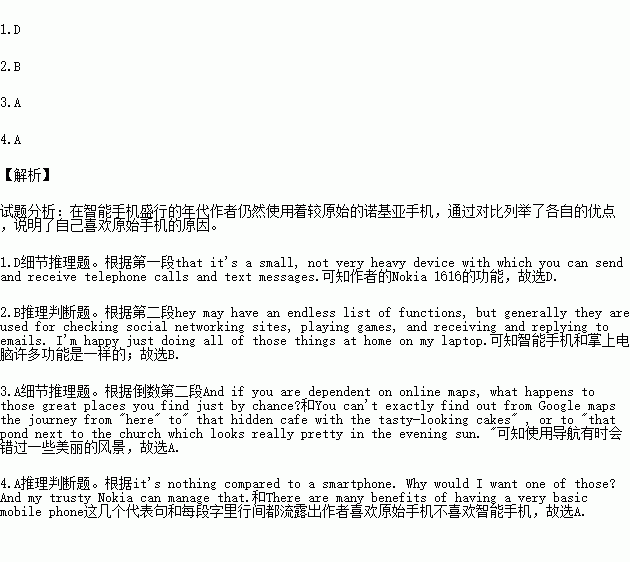题目内容
By today's standards, my mobile phone is pretty rubbish. It's a Nokia 1616. If that doesn't mean much to you (it's not the kind of phone you see advertised on television), all you need to know is that it's a small, not very heavy device with which you can send and receive telephone calls and text messages. It also has a very handy torch on the top for when you can't find your keys, or when you drop something on the floor in the cinema. Other than that, my phone doesn't do much. Well, it has an alarm, and it probably has a calculator and things like that, but it's nothing compared to a smartphone. Why would I want one of those?
I have often been told that the big advantage of having a smartphone is that "you can do everything with them!" But when was the last time you saw someone doing "everything" with a smartphone? Okay, so they may have an endless list of functions, but generally they are used for checking social networking sites, playing games, and receiving and replying to emails. I'm happy just doing all of those things at home on my laptop.
As far as I can tell, the best thing about having a smartphone is that you can be connected to the Internet all the time. Don't get me wrong, I love the internet, but I just don't see the point of constantly being online. I can't remember the last time I received a Facebook update which was so very urgent that I had to read it as soon as it appeared, and I can't imagine ever having a job which was so important that I would need to read work-related emails immediately. I would think that if someone needed me urgently, they would just ring me rather than send an email. And my trusty Nokia can manage that.
One of the most peculiar(独特的)effects of the smartphone is, in my opinion, the newly-found addiction to maps and navigation (导航) systems. Is there anything more boring than knowing exactly where you are all of the time?! How do you get to know an area if you don't get lost there a few times? And if you are dependent on online maps, what happens to those great places you find just by chance? You can't exactly find out from Google maps the journey from "here" to" that hidden cafe with the tasty-looking cakes" , or to "that pond next to the church which looks really pretty in the evening sun. " It is, of course, true that we all occasionally need to be pointed in the right direction, but I find that there are often real life humans you can ask.
There are many benefits of having a very basic mobile phone, like the fact that it cost me about twenty pounds, and that I don't have to worry too much about it being stolen .But the main benefit has to be the fact that it provides me with the word 'greatest excuse for my bad habits’. Whether it's turning up late to events ,or getting lost on a trip, or missing buses or trains ,or forgetting about an appointment at work ,I'm pretty sure I'm covered with the following explanation: “I’m really sorry, I don't have a smartphone."
1.The writer uses his Nokia 1616 mainly to _______.
A. play online games
B. do calculating work
C. check social network sites
D. make calls and text messages
2.It can be inferred from the above passage that_______.
A. work-related emails should be answered immediately
B. a laptop and a smartphone share many functions
C. smartphones should always be connected to the net
D. a Facebook update is usually very important
3.According to the passage, if you use navigation systems, you may _____
A. miss some really wonderful places
B. find a boring trip actually exciting
C. be persuaded to eat in a certain café
D. be misled to a totally wrong place
4.The writer’s purpose for writing this article is to______
A. explain why he doesn’t want a smartphone
B. warn readers of the risks of using smartphones
C. complain about the troubles caused by smartphones
D. inform readers of the latest development of mobile phones
 阅读快车系列答案
阅读快车系列答案

 ), 并在其下面写出该加的词。
), 并在其下面写出该加的词。